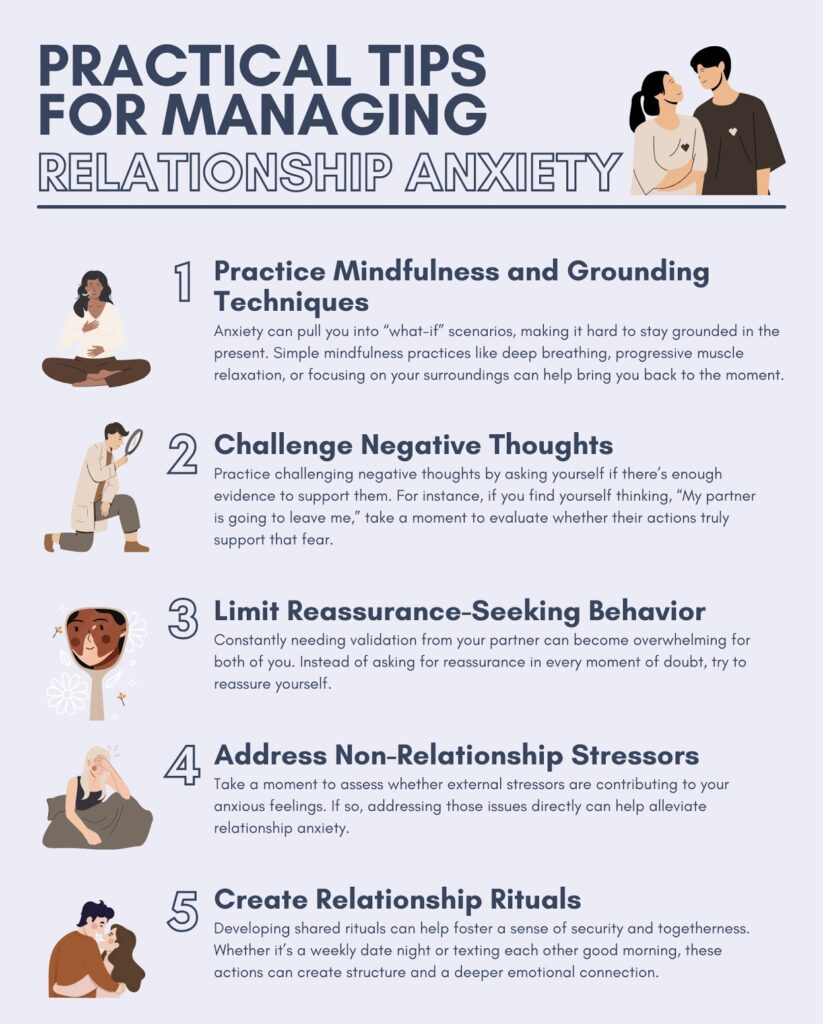
Relationship anxiety is something many people face, whether it’s early on in a new relationship or even after years of commitment. Feelings of insecurity, fear of rejection, or worry about how your partner feels can create stress and uncertainty. These anxieties, while normal to some degree, can take a toll on your mental and emotional well-being if left unchecked. The good news is that relationship anxiety can be managed and overcome with the right tools and mindset. Here are some practical tips to help you develop a healthier relationship mindset and overcome anxiety in your relationship.
1. Recognize and Acknowledge Your Anxiety
The first step in overcoming relationship anxiety is to acknowledge it. Understanding that anxiety in relationships often stems from deep-seated fears—such as fear of abandonment, fear of not being enough, or fear of vulnerability—can be incredibly powerful. By recognizing these feelings, you can start to separate them from the reality of your relationship.
Tip: Journaling your thoughts or discussing your anxiety with a trusted friend or therapist can help you pinpoint the root causes of your worry. This awareness is the first step toward addressing the issue.
2. Challenge Negative Thoughts
One of the most common symptoms of relationship anxiety is the tendency to overthink or catastrophize situations. For example, you might interpret your partner’s silence or a missed text as a sign they are upset with you or losing interest. These negative thoughts can spiral and create unnecessary stress.
Tip: When you notice anxious thoughts creeping in, pause and ask yourself, “Is this thought based on facts or assumptions?” Challenge these thoughts by focusing on evidence that contradicts them. For example, if your partner hasn’t responded immediately, remind yourself that they might simply be busy—not uninterested.
3. Communicate Openly with Your Partner
Effective communication is key to reducing anxiety in a relationship. Often, relationship anxiety arises from a lack of clarity or fear of misunderstanding each other’s intentions. Being able to talk openly with your partner about your feelings, concerns, and expectations fosters emotional intimacy and trust.
Tip: Share your feelings calmly and openly with your partner, without placing blame or pressure on them. For example, say, “I’ve been feeling anxious lately about our relationship, and I just wanted to talk about it with you.” This invites understanding and creates a safe space for both of you to express your thoughts.
4. Focus on Building Self-Confidence
Often, relationship anxiety can stem from a lack of self-worth or insecurity. When we don’t feel confident in ourselves, we become overly reliant on our partner’s affection or validation. Building your self-esteem and self-confidence can reduce anxiety and increase your sense of security in the relationship.
Tip: Engage in activities that make you feel good about yourself, whether it’s pursuing personal goals, spending time with friends, or practicing self-care. When you feel secure in your own identity, you’re less likely to feel threatened by the relationship or overly dependent on your partner’s approval.
5. Practice Mindfulness and Self-Soothing Techniques
Mindfulness can be an incredibly effective way to manage anxiety in relationships. By practicing mindfulness, you can stay grounded in the present moment, rather than getting lost in “what if” scenarios. Self-soothing techniques, such as deep breathing, meditation, or taking a walk, can help calm your mind when anxiety flares up.
Tip: When you feel anxious, take a few deep breaths and bring your focus back to the present moment. Ask yourself, “What is happening right now? Is there any real threat, or am I just projecting my worries into the future?” This simple practice can help you break the cycle of anxious thinking.
6. Establish Healthy Boundaries
Sometimes, relationship anxiety stems from a lack of personal space or unhealthy dynamics. Establishing and respecting boundaries within the relationship is crucial for maintaining individual identities and emotional well-being. It’s important to remember that a healthy relationship allows for both connection and personal independence.
Tip: Have open conversations with your partner about what you both need in terms of personal space, alone time, and emotional boundaries. Respecting each other’s needs helps create a balanced, secure relationship.
7. Don’t Rush the Relationship
A common source of relationship anxiety is rushing things or feeling pressure to meet certain milestones too quickly. Whether it’s worrying about commitment, labels, or the “right time” to introduce new aspects of the relationship, these pressures can create unnecessary stress.
Tip: Let the relationship unfold naturally, without placing arbitrary timelines or expectations on it. Allowing space for growth at its own pace reduces anxiety and fosters a more organic connection.
8. Seek Professional Help if Needed
If your relationship anxiety is persistent, overwhelming, or affecting your well-being, it may be helpful to seek the support of a therapist or counselor. Sometimes, anxiety can stem from past experiences, attachment styles, or unresolved emotional wounds that require professional guidance to heal.
Tip: If you find that anxiety is taking a significant toll on your mental health or your relationship, don’t hesitate to reach out for therapy. Speaking to a mental health professional can provide you with personalized tools to manage anxiety and build a healthier mindset.
9. Focus on Building Trust
Anxiety in relationships often arises from a lack of trust, whether it’s trust in your partner’s feelings, your partner’s behavior, or trust in the relationship itself. Building trust takes time and consistent effort, but it’s foundational to a healthy, secure connection.
Tip: Build trust by being open, reliable, and honest with your partner. Show up for them consistently and encourage them to do the same for you. Trust also means allowing space for mistakes and misunderstandings, knowing that you can work through them together.
10. Celebrate Your Growth
Lastly, it’s important to recognize and celebrate the progress you’ve made in managing your relationship anxiety. Overcoming anxiety is a journey, and it’s important to acknowledge the positive changes, no matter how small they may seem.
Tip: Take time to reflect on your growth and how you’ve learned to manage anxiety. Celebrate moments when you’ve been able to communicate openly or let go of unfounded worries. Acknowledging your progress reinforces your ability to handle challenges in the future.
Conclusion: Cultivating a Healthy Mindset
Relationship anxiety is natural, but it doesn’t have to control you. By acknowledging your feelings, practicing self-care, and building trust and communication with your partner, you can shift your mindset toward a healthier, more balanced approach to love. It’s a process that requires patience, self-compassion, and effort from both you and your partner. With time, you can overcome relationship anxiety and create a more secure, fulfilling connection based on mutual trust and understanding.

Tags:
Subscribe To Get Update Latest Blog Post
No Credit Card Required



